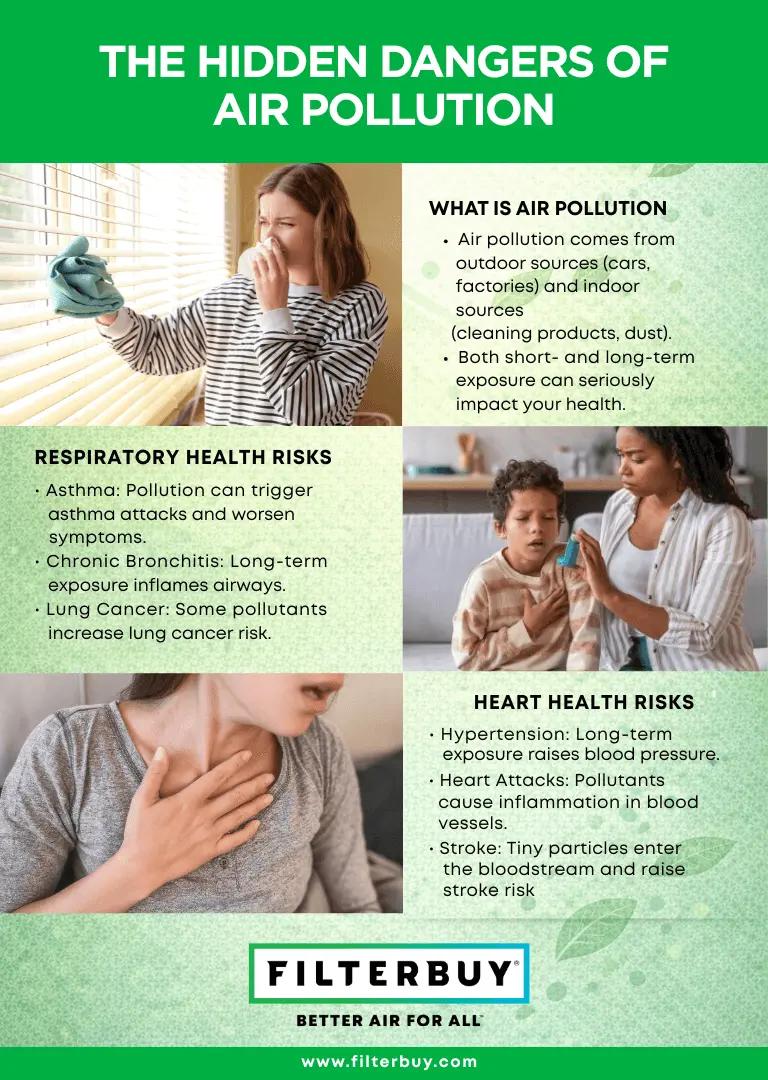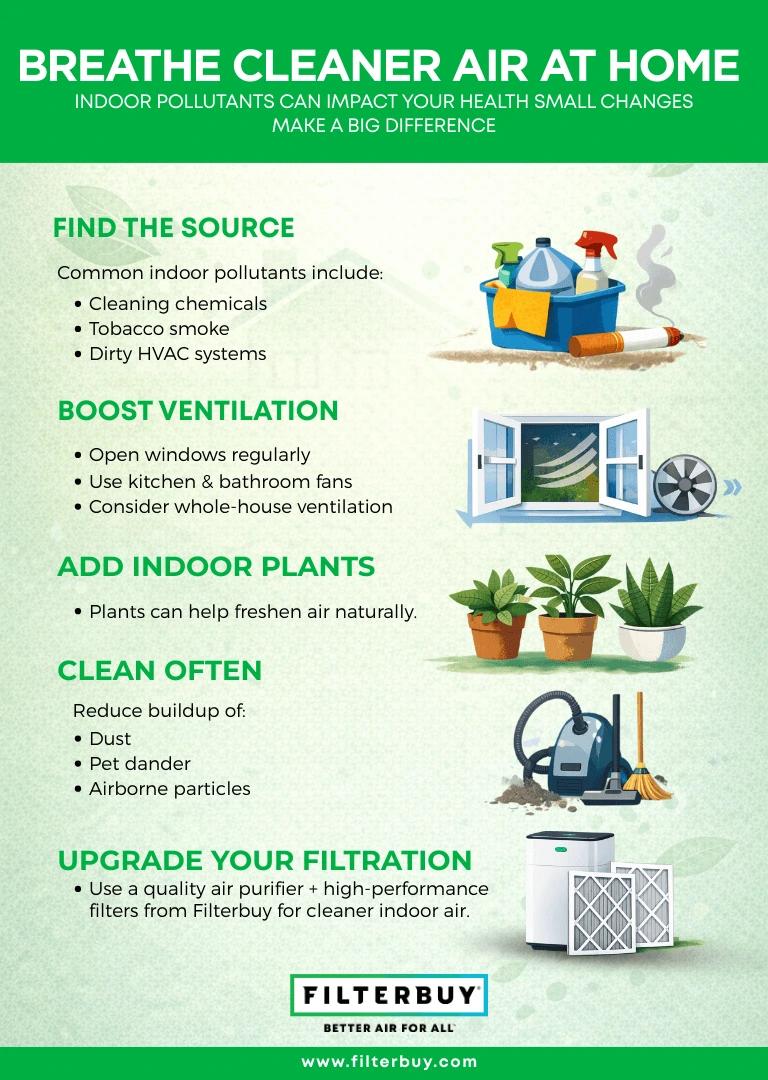Shop by

Did you know that air quality in neighborhoods can silently impact your health? In fact, long-term exposure to polluted air causes respiratory problems like chronic bronchitis and asthma. Cardiovascular issues such as hypertension and heart failure may also happen from said pollution. Most people do not realize that it can cause other health issues, too. For example, potential memory impairment and increased risks for Alzheimer's or Parkinson's can happen due to exposure to air pollution.
When it comes to indoor sources of air pollution, don’t worry—you can breathe easily at home with Filterbuy’s high-performance air filters. Designed to capture pollutants from cleaning products, heating systems, and other indoor sources, our filters create a healthier living environment. Enjoy cleaner air and improved well-being with every breath with us.
The quality of our environment directly influences the air we breathe. Air pollution, stemming from numerous sources, poses significant health risks. Even indoors, pollution can affect us through household items like cleaning supplies and gas stoves.
Once you encounter poor air quality, it can cause symptoms like coughing and other health conditions such as asthma. But, we will explore these in detail in the next sections, for now let's first focus on learning about air quality and what we can do about it.
Urban planning is essential in managing air pollution. Strategic design and public policies can help limit pollution in cities. However, it does not stop there. Community awareness and changing daily habits can also reduce individual contributions to air pollution.
One addition to your daily routine is a high-quality air purifier that you can buy at Filterbuy. With this, you can remove contaminants from your home’s indoor air. It can also improve overall air quality, especially when you partner it with proper ventilation, like opening windows and doors. Regularly replace your air filters, too, to keep your unit’s efficiency at top levels. Doing so will also retain your home’s healthy indoor air.
The quality of air around you actually impacts your overall health. Many often overlook this problem, but there are tons of chronic respiratory conditions influenced by pollution exposure, making it a critical concern.
Short-term effects of poor air quality, like coughing or breathing difficulties, are well-known. However, long-term consequences are more severe and often ignored. Asthma prevalence, for example, is directly linked to said pollution.
Reflect on these long-term effects of poor air quality on respiratory health:

Bad air quality, in particular, has hidden dangers behind it. Not only for the respiratory system but also for your cardiovascular one. Remember that being exposed to pollution does not just cause you discomfort for a short time; it also determines health consequences in the long run, especially concerning your heart.
Many cardiovascular diseases are reported to be caused by pollution, including heart diseases like high blood pressure (hypertension) and heart attacks. This happens because inhaling polluted air allows tiny particles to penetrate through your blood vessels, causing inflammation in blood vessels and then heart complications.
The risk of heart disease is relative to the duration and intensity of the pollution exposure. Higher vulnerability factors are posed to residents living in areas with poor air quality. Additionally, some elements of indoor air quality are significant in that unventilated places and other household products lead to indoor pollution.

Emerging research indicates pollution impacts the heart, lungs, and brain. Poor air quality can trigger numerous neurological consequences that are often unnoticed. This isn't limited to short-term effects like headaches or dizziness; long-term cognitive health also faces risks.
It is vital to recognize that the air filling the lungs also affects neurological health. Paying attention to daily air quality is vital, as is understanding the long-term effects of air quality on overall health, including the brain.
Prioritizing home air quality is essential. Indoor pollutants may cause long-term health issues, so preventative actions are vital.
Start by identifying common sources of indoor pollution. These might include cleaning products, tobacco smoke, and unmaintained heating systems. Once pinpointed, reduce their usage or seek healthier alternatives.
Good ventilation helps maintain air purity. It eliminates stale air and lets in fresh air. Open windows, and as you open them from time to time, use the ventilation fans installed in your kitchen or bathrooms or install a whole-house ventilation system.
Incorporate indoor plants as well. They not only add to decor but also serve as natural air purifiers.
Regular cleaning and HVAC units play a significant role too. Dust, pet dander, and small particles can build up and degrade air quality. So, get an air purifier with high-quality filters from Filterbuy to enhance your home’s indoor air quality.

Air quality significantly impacts our health, with particulate matter, nitrogen dioxide, and sulfur dioxide being particularly harmful. These pollutants can penetrate the respiratory tract, causing asthma, bronchitis, and other respiratory issues. Long-term exposure can lead to cardiovascular diseases, lung cancer, and exacerbate existing health conditions.
Common indicators of poor air quality exposure include coughing, sneezing, shortness of breath, and irritation of the eyes, nose, and throat. More severe symptoms may involve aggravated asthma attacks, fatigue, and difficulty breathing. In severe cases, immediate medical attention is necessary.
The Air Quality Index (AQI) is a measure of air quality. An AQI above 100 indicates unhealthy levels for sensitive groups. For the general population, an AQI over 150 is unhealthy, and above 200 is very unhealthy, posing serious health risks.
Polluted air can contribute to various health problems, including asthma, chronic bronchitis, emphysema, lung cancer, heart disease, stroke, respiratory infections, chronic obstructive pulmonary disease (COPD), diabetes, and adverse pregnancy outcomes like low birth weight and preterm birth.
Poor air qualitycan lead to respiratory issues like asthma and bronchitis, increase the risk of cardiovascular diseases, hinder lung growth in children, elevate the risk of cancer, and shorten life expectancy.
According to recent statistics, cities like Los Angeles, California, always top the list of having the worst air quality in the US, primarily from ozone and particulate matter pollution.
In fact, poor air quality can make one ill. Bad air increases the occurrence or worsening of respiratory and cardiovascular diseases, and it leads to a higher risk of developing dangerous diseases such as cancer and infections.
Signs of potential toxicity in your home include persistent mold or mildew, unusual odors, chronic respiratory symptoms among residents, and visible water damage. Additionally, testing for radon, carbon monoxide, and other hazardous materials can help assess the safety of your indoor environment.
Poor air quality may leave you breathless, especially during exercise or rest. A rapid decrease in oxygen in the body will make you feel tired. However, low-quality air due to unmaintained units may trigger headaches, dizziness, and irritation of the eyes, nose, and throat. Moreover, it leads to chronic coughing and wheezing. More importantly, it exacerbates a patient's underlying medical condition.
Pay attention to air quality when the AQI exceeds 100, especially if you are in a sensitive group like children, the elderly, or individuals with pre-existing health conditions.
The amount of time you can safely spend outdoors depends on the AQI. Limit prolonged outdoor activities when the AQI is between 101 and 150. If the AQI is above 150, especially for vulnerable groups, staying indoors as much as possible is advisable.
An AQI of over 300 indicates hazardous air quality, posing serious risks to everyone. Emergency declarations are often issued in such cases, and staying indoors is strongly recommended.